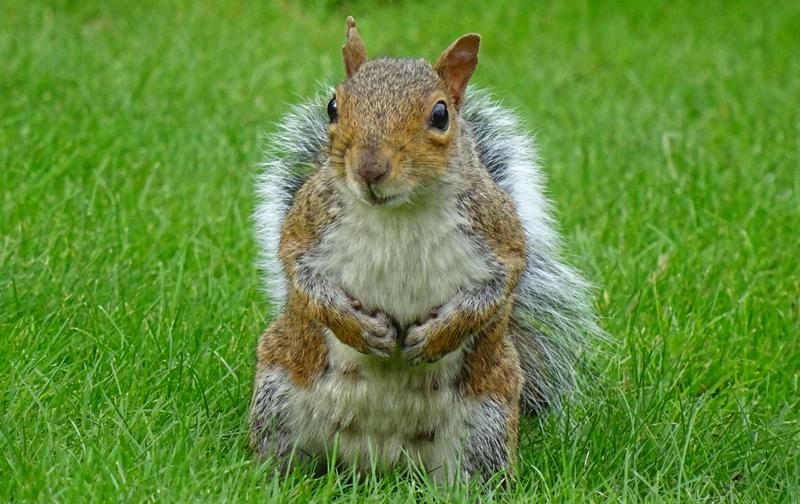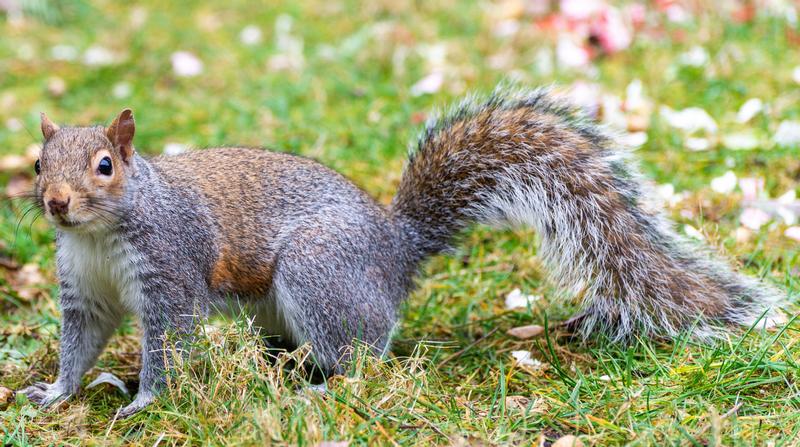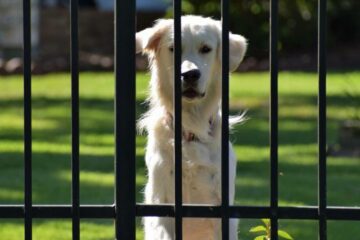Why Do Dogs Chase Squirrels? (+How to Stop It!)
Is your dog chasing squirrels constantly and you’re not sure what’s going on with them? In this article, we’ll answer everything you need to know about the question “why do dogs chase squirrels?” and discuss the steps you can take to manage this behavior.
We’ll explain the reasons behind your dog’s love for chasing squirrels, whether it’s during your daily walks or in the middle of the night. We’re also going to touch on what to do if your dog ate a squirrel after catching one! Keep reading for all these things and more below!
How to Stop Dog From Chasing Squirrels

Stopping a dog from chasing squirrels can be a challenge, but they need to learn to listen to your commands for their own safety (not just other animals and people). A dog absorbed in a chase can accidentally run into traffic or get lost.
Train a Reliable Recall
A reliable recall is the command your dog will follow no matter what. It is especially useful in situations when your dog might be inclined to chase squirrels. To train this, start in a distraction-free environment. Call your dog to you, and when they come, reward them with a treat or praise. Gradually increase the level of distractions once your dog has mastered the command in a quiet setting.
Use the ‘Leave It’ Command
The ‘leave it’ command teaches your dog to ignore something when you ask. Begin by placing a treat in both hands. Open one hand and say ‘leave it.’ If your dog moves towards the treat, close your hand. Once your dog backs away, say ‘good’ and give them the treat from the other hand. Practice this until your dog can ignore the open hand when you say ‘leave it.’
Teach Focus
Teaching your dog to focus on you rather than the squirrel can help prevent chasing. Start by saying your dog’s name. If they look at you, reward them. Practice this in various settings to help your dog understand that paying attention to you is more rewarding than chasing a squirrel.
Keep Your Dog on a Leash
Until your dog is reliable with the above commands, keep them on a leash when in an area with squirrels. This will prevent any unwanted chasing while you’re still in training.
But while these steps will get your dog to stop chasing squirrels, you need to remember that the underlying behavioral issues (prey drive, aggression, overexcitement, etc.) that were causing all of this to begin with will still be present. And until you address those, any positive changes you see are only going to be temporary.
“Well, how do I make these changes last?”
By getting your dog to truly choose to follow your direction, that’s how. I tried many times to write out how you can do that before deciding it made more sense to just link you to the free video series that explains it better than I’d ever be able to.
The series is by a man named Dan who is one of the world’s leading dog obedience trainers. In it, he teaches you how to put an end to things like when your dog chases squirrels and all other misbehavior using his fast and easy-to-follow methods.
In the first video, Dan will reveal to you why the two most common methods of dog training only doom you to failure. You can watch the video now by clicking here. Follow the proven system he’ll show you in his series and you’ll never have to spend another second worrying about your dog chasing squirrels ever again!
Why Dogs Chase Squirrels

Dogs chase squirrels mainly due to their predatory instincts, high energy levels, viewing squirrels as an intruder in their territory, and because they see squirrels as small game or prey. It can also be seen as a form of entertainment or a way to get your attention.
Let’s take a closer look at these reasons:
- Predatory Instincts: Dogs, like their wolf ancestors, have a strong instinct to chase and capture small animals that run. This is an innate trait that comes from their ancestors who needed to hunt for survival. Squirrels, with their quick, nimble movements and small size, often trigger this instinctive predatory behavior in dogs.
- High Energy Levels: Dogs are often high-energy animals and they need ways to burn off that energy. A squirrel’s darting and scampering around provides an exciting chase that can effectively help your dog expend some of that boundless energy. The act of chasing a squirrel can give dogs a good workout, providing both exercise and mental stimulation.
- Protecting Their Territory: Dogs are territorial animals and they often see squirrels as intruders. When one enters your pup’s perceived territory, your dog barks at squirrels or chases after them in an attempt to drive them away. This is a natural response aimed at protecting their space from potential threats.
- Entertainment: Dogs can find the act of chasing squirrels highly entertaining. The unpredictability of a squirrel’s movement — the darting, climbing, and scampering — can be a thrilling challenge for your dog, keeping them engaged and entertained for a considerable amount of time. It’s like a live-action game for them!
- Attention-Seeking: Dogs sometimes might chase squirrels or chase birds to get your attention. If they have learned that such behaviors evoke a reaction from you, they may continue to do it. This could be in the form of you chasing after them, or the verbal attention you give when you tell them to stop. Dogs, being social animals, often engage in behaviors that get them attention from their human companions.
Understanding these reasons can help you manage your dog’s behavior and keep them safe and well-behaved during your walks or yard play times. To learn how to stop your dog chasing squirrels, go back to the first section now and we’ll give you all the steps you need.
Should I Let My Dog Chase Squirrels?
You should not let your dog chase squirrels. Although it might seem like an entertaining game for your pup, there are numerous reasons that make this a bad idea. Here’s a deeper look at why letting your dog chase squirrels might not be the best practice:
- Safety Concerns: When your dog chases a squirrel, they can become so focused that they forget about their surroundings. This could lead them into a busy street or into other dangerous situations. There’s also a risk of your dog getting hurt if they run into something or fall while chasing a squirrel.
- Legal Issues: In many places, letting your dog off-leash, especially if they’re causing a disturbance by chasing squirrels, could get you in trouble with the law. Always make sure to follow local leash laws and public park rules to avoid fines and to ensure the safety and enjoyment of others.
- Wildlife Disturbance: Constantly being chased by dogs can stress squirrels and other wildlife. It’s important to remember that parks and forests are their homes, and we should respect that. Squirrels might also carry diseases that could be passed onto your dog.
- Instilling Bad Habits: If you let your dog chase squirrels, they might think it’s okay to chase other small animals as well. This could be a problem if they start chasing other dogs, cats, or even small children. It’s best to teach your dog to stay calm around small, moving objects.
- Training Difficulties: Allowing your dog to chase squirrels can make it harder to train them. It reinforces the idea that they can ignore your commands when there’s something more exciting happening. It’s better to train your dog to ignore squirrels from the start. Go back to the first section for more on how to do that.
While chasing squirrels might seem like a fun game for your dog, there are many reasons why it’s best not to encourage this behavior. Not only does it pose potential risks to your dog’s safety, but it can also lead to legal trouble, disturb wildlife, encourage bad habits, and make training more difficult.
If your dog loves to chase, consider other ways to engage their prey drive, like playing fetch or using toys that mimic the movement of small animals.
Why Does My Dog Chase Squirrels at Night?
If your dog is chasing squirrels at night mainly, you’re surely wondering what’s going on with them. There can be several reasons for this behavior, and understanding them can help you manage your dog’s squirrel-chasing habit.
Predatory Instinct
A key reason dogs chase squirrels, even at night, is their innate predatory instinct. This instinct drives dogs to chase small, fast-moving animals like squirrels. At night, squirrels may be more active, and your dog might notice this increased activity and respond accordingly.
Increased Senses at Night
Dogs have exceptional night vision and a strong sense of smell. Squirrels and other animals like possums can be more active during the night, and your dog may detect their scent or movement. This could stimulate your dog’s chase instinct more than during the day.
Boredom
If your dog is chasing squirrels at night, it may also be a sign of boredom. Dogs require mental stimulation and physical exercise. If they do not get enough of these during the day, they may turn to activities like chasing squirrels to burn off energy.
Anxiety or Fear
Sometimes, dogs chase squirrels due to anxiety or fear. If your dog is anxious or fearful, they may chase squirrels as a coping mechanism. Sudden movements or sounds made by squirrels at night might trigger this reaction.
Understanding why dogs chase squirrels at night (more on handling that in the first section) can help you take the necessary steps to manage this behavior. Whether it’s providing more daytime activity, increasing training, or helping them with their anxiety, there are ways to reduce your dog’s nighttime squirrel chasing.
My Dog Chases Squirrels on Walks
If your dog chases squirrels during your walks, it can be both challenging and disruptive. Here’s a deeper look into why your dog might behave this way and some strategies to manage this behavior.
Natural Predatory Instinct
At their core, dogs are predators. They are instinctively driven to pursue small, quick-moving creatures such as squirrels. This instinct goes back to their ancestors who relied on hunting for survival. In the case of your dog chasing squirrels during walks, it’s not necessarily about wanting to harm the squirrel. It’s often more about the thrill of the chase, the surge of adrenaline, and the inherent instinct of pursuing a potential ‘prey’.
Overstimulation
Dogs, especially young ones or certain breeds, can be easily excited. Squirrels, with their rapid, unpredictable movements and high-pitched noises, can provide an extreme source of stimulation. Just the sight or sound of a squirrel can trigger your dog’s chase response, making it challenging for them to maintain composure and resist the urge to pursue.
Lack of Training
If your dog has not been adequately trained to ignore distractions during walks, they’re more likely to give in to their impulses, like chasing squirrels. Training your dog to focus on you, obey commands reliably, and stay calm, regardless of the distractions around them, can significantly help manage their squirrel-chasing behavior.
How to Stop Dog Chasing Squirrels on Walks
- Leash Training: Begin by teaching your dog to walk nicely on a leash. This means they should not pull and should stay by your side, offering you better control. An obedient dog on a leash is much less likely to dart off in pursuit of a squirrel.
- Focus Commands: Teach your dog commands like “look at me” or “leave it”. These commands serve to divert your dog’s attention from the distraction – in this case, a squirrel – and refocus on you. Start teaching these commands in a quiet, controlled environment before gradually adding distractions.
- Positive Reinforcement: Whenever your dog successfully obeys a command or resists the urge to chase a squirrel during a walk, reward them. This could be with a treat, praise, or a favorite toy. Over time, your dog will associate obeying commands and ignoring squirrels with positive outcomes, which will make them more likely to repeat this behavior.
It can be frustrating when your dog chases squirrels on walks, but with patience, consistency in training, and understanding their behavior, it can be managed effectively. Go back to the first section of this article now and we’ll explain more on the need to identify and address what’s really causing your dog’s issue deep down (& how to do so).
Dog Ate a Squirrel: What Do I Do Now?
If your dog ate a squirrel, you might be feeling a bit panicked. It’s obviously not an ideal situation, but don’t worry — there are steps you can take to ensure your dog stays healthy. Here’s what you should do:
- Don’t Panic: While it’s natural to be concerned, panicking won’t help the situation. Stay calm so you can take the necessary actions to help your dog. Remember, dogs have been catching and eating small prey for thousands of years.
- Monitor Your Dog: Keep a close eye on your dog over the next few days. Look for any changes in their behavior or signs of illness, like vomiting, diarrhea, loss of appetite, or lethargy. If you notice anything unusual, call your vet.
- Call Your Vet: It’s a good idea to give your vet a call, even if your dog seems fine. They can provide advice based on your dog’s specific health history. If the squirrel was diseased or carried parasites, your dog could be at risk, and your vet may recommend preventive treatments.
- Prevent Future Incidents: Training your dog to drop items on command or to ignore squirrels entirely can help prevent future incidents. Additionally, maintaining close supervision during walks or playtime outside can help keep your dog safe.
- Get Regular Check-ups: Regular vet check-ups can catch any potential health issues early. This is especially important if your dog has a habit of catching and eating wildlife. Your vet can recommend the best course of action to keep your dog healthy.
In summary, if your dog ate a squirrel, try not to panic. Instead, monitor your dog’s health closely and consult with your vet. You can also take steps to teach your dog not to chase squirrels to prevent future incidents. Remember, each dog is different, so what works for one might not work for another. With patience and proper care, you can help your dog navigate this situation safely.
I’m sure you’re looking forward to not worrying about your dog chasing after squirrels anymore, so I’ll let you get going on things now. Best wishes, and thanks for reading our article “Why Do Dogs Chase Squirrels? (+How to Stop It!)”





